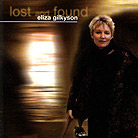May 2002
Ms. Gilkyson has journeyed far and wide in her own musical travels. Her first release, Pilgrims, was apparently an atmospheric recording that pegged her as a new-age artist. She has released six discs since then, including this one, her second for Red House Records. There's nothing new-age about Lost and Found. Gilkyson plays American music -- country, blues, folk and rock'n'roll. There’s a refreshing purity to her approach -- a complete lack of major-label gloss and insincerity. That authenticity extends to the recording, which has the sort of honest, unfussy feel that only comes from sweating the details. Ms. Gilkyson has a slightly raspy voice that carries with it the suggestion of varied experiences and, perhaps, a few cigarettes. You feel you can trust her, even in the few instances that she lapses into cliché. "Fall Into the Night" opens with the lines, "Baby take your blue jeans off/Lay your body down." How many songs since the late '60s have contained those lines or something similar? More than we can count, surely, but from Gilkyson they sound honest, if not particularly fresh. She follows them with something more poetic: "Leave the windows open/Let the night blow us around." In most instances, the poetry wins out on Lost and Found. Gilkyson’s is a voice of experience, but she doesn’t condescend. She isn’t full of self-pity, either. She’s weathered a few trials and they’ve made her stronger. On "Welcome Back," she sings, "It was all sackcloth and ashes/For a couple of years/I took my licks and my hundred lashes/I cried a bucket of tears." Her real message comes later in the song: "It was a pretty dark day/But now the sun is shining." While Gilkyson started with ten great songs, it’s her smart ear as an arranger that really puts them across. They’re built around her outstanding guitar playing (on both acoustic and electric), to which she adds strong individual players who provide exactly the sound and feel she needs. When the level of musicianship is as high as it is here, it’s tough to single out anyone. But Rich Brotherton’s mandolin playing is so good and is used to such strong effect that it seems to hold Lost and Found together. My favorite moment on the disc (if I had to choose just one) is the point in "Mama’s Got a Boyfriend" when Gurf Morlix enters on slide guitar -- you can almost see the VU meter jump. I can’t be certain, but I like to think that Morlix is playing an old Montgomery Ward or Danelectro guitar through a Silvertone twin-twelve set to "7." Ms. Gilkyson chose her background singers just as carefully. Mark Hallman, Patty Griffin, and Slaid Cleaves each create vastly different effects when they harmonize with her. Hallman, for example, sings in a lower register than Gilkyson, and their voices blend to create a feeling of solidity and strength. Gilkyson’s duet with Patty Griffin on "Heart of a Man" creates a different sound altogether. Griffin’s higher voice and softer timbre help Gilkyson convey the tender, almost fragile longing contained in the lyrics. I listened to Lost and Found a lot the first week I had it. It’s a very accessible disc, and my experience is that discs I like right away can lose their charm after a few plays. I found that I liked it more each time I heard it. But it’s not perfect. I’m not sure I like "Richmond Boy," and I wish she hadn’t included the line "He puts the seat down in the night" there (she follows it with a little chuckle -- the one moment that sounds calculated in a recording that otherwise feels so genuine). When I played the disc for my wife the second time, she described it well, "There's nothing complicated about the songs. It's like they organically grew somewhere and she just picked them." Lost and Found feels natural and unforced. Make no mistake, though. Writing songs this good and playing and singing them this well while making it seem effortless -- that’s very complicated indeed. GO BACK TO: |
 Eliza Gilkyson - Lost and Found
Eliza Gilkyson - Lost and Found![[Reviewed on CD]](../format/regcd.gif) Eliza
Gilkyson would seem to have come by her songwriting talent honestly. Her father, Terry
Gilkyson, wrote a few hit songs in the '50s, of which the best known is "Memories Are
Made of This," which charted number one for Dean Martin in 1955. Gilkyson had a long
and varied career in music that included writing for films (he received an Oscar
nomination for "The Bare Necessities" from Disney’s The Jungle Book), but
he made his real mark in folk music with a group called the Easy Riders. He passed his
musical talent along to Eliza and her brother Tony, who played guitar in the legendary LA
band X when Billy Zoom left in 1985.
Eliza
Gilkyson would seem to have come by her songwriting talent honestly. Her father, Terry
Gilkyson, wrote a few hit songs in the '50s, of which the best known is "Memories Are
Made of This," which charted number one for Dean Martin in 1955. Gilkyson had a long
and varied career in music that included writing for films (he received an Oscar
nomination for "The Bare Necessities" from Disney’s The Jungle Book), but
he made his real mark in folk music with a group called the Easy Riders. He passed his
musical talent along to Eliza and her brother Tony, who played guitar in the legendary LA
band X when Billy Zoom left in 1985.